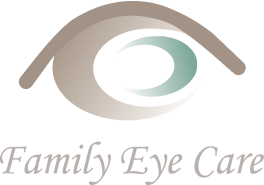Are your eyes feeling irritated, dry, or sensitive to light? It could be dry eye syndrome. Here at Family Eye Care, we’re committed to helping your eyes be the happiest and healthiest they can be. Let’s take a closer look at dry eye syndrome and how to tackle it.
What is dry eye syndrome?
Dry eye syndrome is a common ocular condition characterized by inadequate tear production or poor tear quality, leading to discomfort and visual disturbances. This is because tears are essential for maintaining the health of the ocular surface, providing lubrication, nourishment, and protection against foreign particles and infection.
Symptoms of dry eye syndrome
Symptoms of dry eye can vary but often include:
- A sensation of dryness or grittiness in the eyes
- Redness and irritation
- Excessive tearing as a reflex response to dryness
- Blurred or fluctuating vision
- Sensitivity to light
- Difficulty wearing contact lenses comfortably
What causes dry eyes?
Dry eye syndrome can be caused by various factors, including age, hormonal changes, environmental factors (such as dry air, wind, or smoke), certain medications, systemic diseases (such as thyroid disorders), and prolonged screen time.
Diagnosing dry eyes
Diagnosis of dry eye typically involves a comprehensive eye examination, including assessment of symptoms, evaluation of tear production and quality, and examination of the ocular surface. Specialized tests may also be conducted to determine the severity and underlying causes of dry eye.
How to treat dry eyes
The treatment and management of dry eye focuses on relieving symptoms, improving tear production and quality, and protecting the ocular surface. There are several options.
Artificial tears
Lubricating eye drops can provide temporary relief from dryness and irritation by supplementing natural tear production.
Lifestyle modifications
Avoiding environmental factors that exacerbate dry eye, such as exposure to smoke, wind, and dry air, can help alleviate symptoms. Additionally, maintaining proper hydration and a balanced diet rich in omega-3 fatty acids may support overall eye health.
Prescription medications
In cases of chronic or severe dry eye, prescription medications such as anti-inflammatory eye drops or immunomodulators may be prescribed to reduce inflammation and promote tear production.
IPL (intense pulsed light) treatment
IPL therapy has emerged as an innovative and effective treatment option for some forms of dry eye. This non-invasive procedure uses pulses of light to target abnormal blood vessels and inflammation in the eyelids, improving meibomian gland function and tear film stability. IPL treatment has shown promising results in reducing symptoms and restoring ocular surface health in patients with meibomian gland dysfunction associated with dry eye.
Book an appointment
If you are experiencing symptoms of dry eye, schedule an appointment with our experienced optometrists today.


